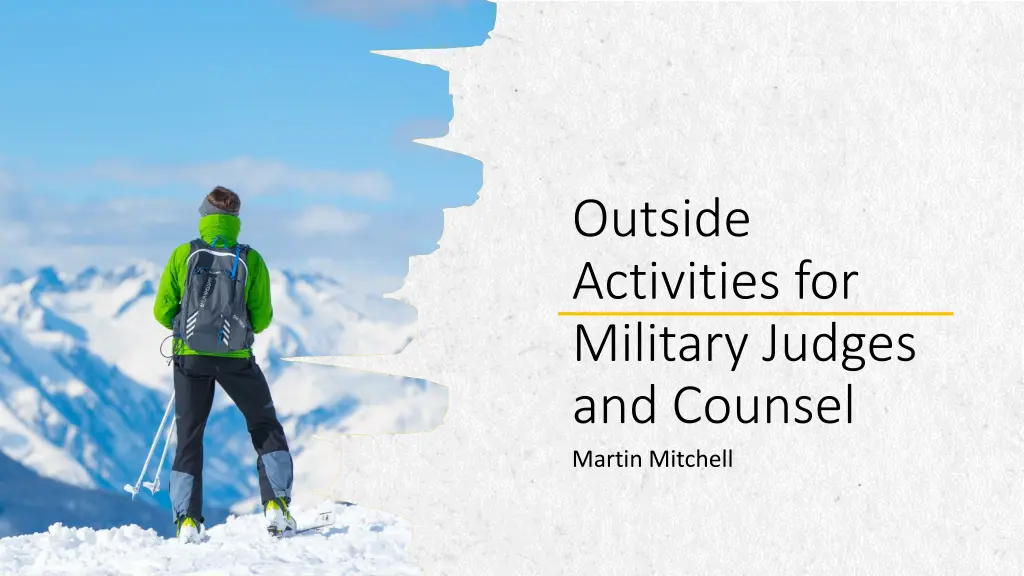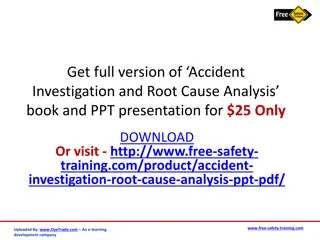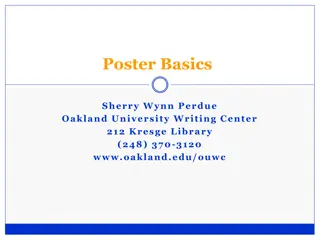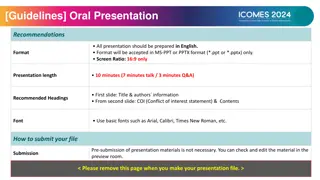
Military Judges' Outside Activities and Legal Ethics Overview
Discover insights on the outside activities for military judges, ethical considerations for lawyers, and potential disciplinary actions from a legal perspective. Explore topics like DC Bar Rules, attorney misconduct, and the intersection of legal practice and insurance sales.
Download Presentation

Please find below an Image/Link to download the presentation.
The content on the website is provided AS IS for your information and personal use only. It may not be sold, licensed, or shared on other websites without obtaining consent from the author. If you encounter any issues during the download, it is possible that the publisher has removed the file from their server.
You are allowed to download the files provided on this website for personal or commercial use, subject to the condition that they are used lawfully. All files are the property of their respective owners.
The content on the website is provided AS IS for your information and personal use only. It may not be sold, licensed, or shared on other websites without obtaining consent from the author.
E N D
Presentation Transcript
Outside Activities for Military Judges and Counsel Martin Mitchell
Disclaimer Disclaimer: The views in this presentation are those of the author and do not necessarily reflect the official policy or position of any current or former employer.
Are you ever not an attorney or judge? Questions about what you can do in your off time? What are situations that have resulted in disciplinary actions? Not addressing: Rules on outside employment of government employees
DC Bar Rule 8.4 MISCONDUCT DC Bar Rule 8.4 MISCONDUCT It is professional misconduct for a lawyer to: (a) Violate or attempt to violate the Rules of Professional Conduct, knowingly assist or induce another to do so, or do so through the acts of another; (b) Commit a criminal act that reflects adversely on the lawyer s honesty, trustworthiness, or fitness as a lawyer in other respects; (c) Engage in conduct involving dishonesty, fraud, deceit, or misrepresentation; (d) Engage in conduct that seriously interferes with the administration of justice; (e) State or imply an ability to influence improperly a government agency or official; (f) Knowingly assist a judge or judicial officer in conduct that is a violation of applicable rules of judicial conduct or other law; or (g) Seek or threaten to seek criminal charges or disciplinary charges solely to obtain an advantage in a civil matter.
DC Bar Rules DC Bar Rule 8.4 Comment [3] A lawyer violates paragraph (d) by offensive, abusive, or harassing conduct that seriously interferes with the administration of justice. Such conduct may include words or actions that manifest bias or prejudice based upon race, sex, religion, national origin, disability, age, sexual orientation, or socioeconomic status.
Outside Employment as Insurance Broker Attorney plans to practice law and sell insurance products to both clients and the general public. Whether the Rules of Professional Conduct allow a lawyer to practice law and sell insurance simultaneously from the same office. Whether it was ethical for her to offer to sell insurance to clients who had retained her for legal services.
Applicable Rules Rule 1.6 (Confidentiality of Information) Rule 1.7 (Conflict of Interest: General Rule) Rule 1.8 (Conflict of Interest: Prohibited Transactions) Rule 8.4 (Misconduct)
Selling Insurance to Non-Clients When the inquirer is selling insurance to non-clients, she is not functioning as a lawyer or dealing with individuals whom she has represented as a lawyer. Accordingly, the inquirer must ensure the client understands that she is acting exclusively as an insurance broker and not as a lawyer in the insurance transaction. As a member of the Bar, however, the inquirer must still comply with certain Rules of Professional Conduct even though she is selling insurance instead of practicing law. The relevant Rules of Professional Conduct would be those that apply to lawyers acting in non-lawyer capacities. See, e.g., Rule 8.4 (lawyer may not [e]ngage in conduct involving dishonesty, fraud, deceit, or misrepresentation ).
Similar Opinions - So many insurance agents New York State Bar allowed the lawyer to sell insurance products to non- clients subject to the obligation to avoid deceitful conduct and subject to solicitation rules. South Carolina: practicing attorney with insurance license not prohibited from selling life insurance in S.C. Utah : lawyer may sell insurance products to existing legal clients after fulfilling the disclosure and consent requirements Michigan: lawyer/insurance agent may sell insurance to law clients provided that ethics rules regarding business transactions with clients, confidentiality, and conflicts of interest are observed Illinois: lawyer may sell insurance products to legal clients with disclosure and consent
Can a Nebraska lawyer invest in medical cannabis business in South Dakota? At time of the opinion, medical cannabis was illegal in Nebraska but legal in South Dakota At the federal level, marijuana technically remains illegal But Congress prohibited the use of federal funds to interfere with the implementation of state medical cannabis laws. H.R. 4660 113th Congress (2013-2014) What are your thoughts?
Rule 8.4 MISCONDUCT Rule 8.4 MISCONDUCT It is professional misconduct for a lawyer to: (b) Commit a criminal act that reflects adversely on the lawyer s honesty, trustworthiness, or fitness as a lawyer in other respects; (c) Engage in conduct involving dishonesty, fraud, deceit, or misrepresentation; (d) Engage in conduct that seriously interferes with the administration of justice;
Application Generally, lawyers are free to engage in businesses to the same extent as other members of the public No Nebraska law prohibits investing in the cannabis industry that is acting within the bounds of state law Similar opinions from New York and Washington State Different if illegal distribution of marijuana in Nebraska Revisit if federal government changes it s position Dissent: Still illegal at federal level even if not enforced and illegal in Nebraska so NO!
UCMJ, 112a I am not suggesting that anyone here should invest in the cannabis industry
What are your thoughts on other investments that are illegal in your state but legal in the other state? Is there a percentage of illegality that is required? What if you invest in a multi-national pharmaceutical company that sells drugs in Canada that are not authorized for sale by the US FDA? What if your state outlaws certain medical procedures, could you invest in medical practices that legally perform those procedures in other states?
DC Bar Rule 8.4 MISCONDUCT DC Bar Rule 8.4 MISCONDUCT It is professional misconduct for a lawyer to: (a) Violate or attempt to violate the Rules of Professional Conduct, knowingly assist or induce another to do so, or do so through the acts of another; (b) Commit a criminal act that reflects adversely on the lawyer s honesty, trustworthiness, or fitness as a lawyer in other respects; (c) Engage in conduct involving dishonesty, fraud, deceit, or misrepresentation; (d) Engage in conduct that seriously interferes with the administration of justice; (e) State or imply an ability to influence improperly a government agency or official; (f) Knowingly assist a judge or judicial officer in conduct that is a violation of applicable rules of judicial conduct or other law; or (g) Seek or threaten to seek criminal charges or disciplinary charges solely to obtain an advantage in a civil matter.
Code of Conduct for Federal Judges Canon 1: A Judge Should Uphold the Integrity and Independence of the Judiciary Canon 2: A Judge Should Avoid Impropriety and the Appearance of Impropriety in All Activities Canon 3: A Judge Should Perform the Duties of the Office Fairly, Impartially and Diligently Canon 4: A Judge May Engage in Extrajudicial Activities That are Consistent With the Obligations of Judicial Office Canon 5: A Judge Should Refrain From Political Activity
Army/ 4 Judicial Canons CANON 1 A JUDGE SHALL UPHOLD AND PROMOTE THE INDEPENDENCE, INTEGRITY, AND IMPARTIALITY OF THE JUDICIARY, AND SHALL AVOID IMPROPRIETY AND THE APPEARANCE OF IMPROPRIETY. CANON 2 A JUDGE SHALL PERFORM THE DUTIES OF JUDICIAL OFFICE IMPARTIALLY, COMPETENTLY, AND DILIGENTLY. CANON 3 A JUDGE SHALL CONDUCT THE JUDGE'S PERSONAL AND EXTRAJUDICIAL ACTIVITIES TO MINIMIZE THE RISK OF CONFLICT WITH THE OBLIGATIONS OF JUDICIAL OFFICE. CANON 4 A JUDGE SHALL NOT ENGAGE IN POLITICAL OR CAMPAIGN ACTIVITY THAT IS INCONSISTENT WITH THE INDEPENDENCE, INTEGRITY, OR IMPARTIALITY OF THE JUDICIARY.
Rules for Judges/ NYC Rules: A city administrative law judge shall conduct all of his or her extra-judicial activities so that they do not cast reasonable doubt on the city administrative law judge s capacity to act impartially as a city administrative law judge, and do not detract from the dignity of judicial office, according to city rules of conduct. Query: What about outside employment on a subscription website? A: If it s pornographic, you will be fired!
Judge Volunteers with Nonprofits Judges may solicit funds from family and other non-subordinate judges for non-profits Judges may solicit membership if the organization is concerned with the law, the legal system or the administration of justice
Hey, Mr. DJ do you have a JD? Q: Can a full time judge continue to volunteer as DJ at a non- commercial college radio station? A: Yes, if: 1. No political discussions or commentary 2. No participation in fund-raising 3. Not identify self as a judge May makes PSA such as reminding people to vote on Election Day if non-partisan annoucement
The day the music died A judge may not perform in a rock band s annual benefit concert, even if the judge s name and judicial status will be omitted from advertisements. The judge may not sell concert tickets to friends, but may sell to family members. More than minimal involvement and as the concert s purpose is to raise funds for charity, the judge s participation is impermissible Judge can not use a stage name (we still know it s you)
Im not much into yoga Q: Can a full time court attorney-referee teach yoga for a for-profit yoga studio? A: No Bound by same Rules Governing Judicial Conduct Not allowed to participate in any business entity Must not teach yoga at for-profit yoga studio even if no profit made May teach yoga at a non-profit and use social media to advertise NY previously denied judge who wanted to teach dancing at a private, for profit studio
What about a podcast or hobbies? New York Rules and Decisions: A full-time judge may: engage in non-commercial avocational activities such as music or dance as a hobby (see generally Opinion 09-192/09-231) or participate in a non-commercial podcast concerning science fiction and comic book characters and legal issues that may arise in fictional works (see Opinion 16-05)
What about other public speaking? Law clerks and interns may publicly affirm their commitment to core principles of equality and non-discrimination. Judicial law clerks should not take a public position on any controversial issue, whether or not the issue is likely to come before the court What it prohibits are public statements by law clerks and interns that may reasonably be perceived as taking a side in public controversies, where doing so reasonably could raise concerns about the clerk s or intern s independence and impartiality. This prohibition thus is not limited to public statements that are overtly political or partisan
DC Judicial Code of Conduct Rules This rule applies to all speech available to the public, including on social media, and it applies even if law clerks or interns do not identify their association with the court Law clerks and interns may not belong, or make a financial contribution, to an organization that is substantially involved in political activities or advocacy for one side of a matter of public controversy if membership or the contribution can reasonably be perceived as public endorsement of the organization s political or advocacy positions






















